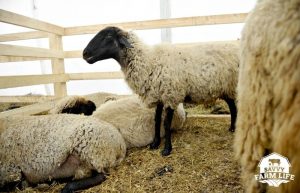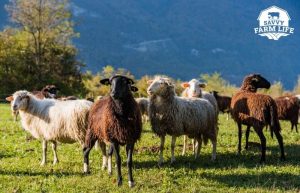
What You Need to Know About Raising Sheep
Are you considering whether or not sheep might be the best addition to your homestead? If so, you may be wondering how difficult it is to raise sheep, and whether the challenges will outweigh the benefits. While only you can make this decision, I can share information I have learned that can give you a better idea of what you’re in for.
How hard is it to raise sheep? Compared to many other livestock, sheep are relatively easy to care for. They do not need as much space as larger livestock animals, they are generally healthy, and they are easy to keep contained. As with any animal however, there are challenges that come along with sheep, such as ease of handling, annual shearing, and other routine care requirements.
Before you go and purchase sheep for your flock, doing research can help prepare you and educate you on how to adequately care for sheep. Read on to learn more of the specifics when it comes to sheep care.
How to Care For Sheep
If you have ever raised an animal that is prone to health problems, you know how challenging it can be to keep them healthy and thriving. While sheep are certainly susceptible to some diseases, they are generally known to be a healthy and low-maintenance species, and in fact are usually described as hardier when compared to other livestock animals.
Deworming Your Sheep
Sheep are grazers, and have their noses (and mouths) to the ground more often than not. Because of this, their bodies have developed a natural tolerance to many ground-dwelling parasites, putting them at a slight advantage over other livestock when it comes to parasitic diseases. With that said, it is still important to de-worm your flock on a regular basis to keep them as healthy as possible. While your deworming schedule may differ based on your region and climate, we deworm our sheep every month. It is always easier to prevent than to treat, and this is especially true with parasitic infestations.
Vaccinating Your Sheep
Aside from a regular de-worming program, you will also want to protect your sheep through the use of annual vaccinations and boosters. The vaccines you choose to use will vary by region; but may include caseous lymphadenitis, clostridial disease, and footrot. Vaccines are an integral part of raising any livestock, and help to protect the entire flock. Most sheep vaccines are to be given annually.
Shearing Your Sheep
One concern many prospective sheep farmers have is the annual shearing. Yes, this is a time-consuming process and can be traumatic for the sheep, but it only needs to be done once per year. You can also choose to raise a hair sheep breed – there are a handful of popular sheep breeds that do not grow wool, instead growing hair that sheds regularly on its own. Popular hair sheep breeds include the Katahdin and the Barbados Blackbelly. If you do choose to raise wool-producing sheep, there are professional shearers that you can hire to do this yearly job for you if you prefer.
Sheep Hoof Care
When looking into the requirements of caring for sheep, you may have heard about footrot. Footrot is a bacterial infection that can affect sheep, and should be treated early to secure the best outcome. Footrot can often be prevented by proper flock and pasture management – including keeping your sheep’s hooves properly trimmed, ensuring bedding is clean and dry, and moving water locations if possible in order to avoid a soggy breeding ground for harmful bacteria. Sheep hooves require trimming on average every 8 weeks.
Medical Care For Sheep
There is an old saying: “a sick sheep is a dead sheep”. By the time your sheep is visibly, obviously unwell, it is likely there has been an infection running through them for some time. Sheep are prey animals, and all prey animals are adept at hiding any illness they have so as to avoid being perceived as vulnerable to predators. It is important to spend time observing your flock and do regular health checks so that you can catch any health problems early. The more time you spend with your sheep, the more likely you will be able to catch any new behavioral changes or other potential issues.
If you do have a sick sheep, it’s important that you have an area where you can quarantine them from the flock until you figure out what the problem is. This can prevent other sheep from getting sick.
Since sheep are herd animals, having to quarantine your sheep can cause them to become stressed and anxious. There are steps you can take in quarantine to help the sheep feel more comfortable. To learn more, visit my article Can You Keep a Sheep By Itself?
Maintain Pasture For Your Sheep
 Sheep are efficient eaters and do not need much room to graze. You can expect to be able to keep 2 sheep on one acre of land while maintaining the pasture. If you rotate pastures or supplement with hay, you can keep 8-10 sheep on one acre. They can get everything they need nutritionally through healthy pasture. One benefit to sheep over larger livestock is that they are relatively kind to pasture, clipping the tops of the grass instead of ripping it out by the roots.
Sheep are efficient eaters and do not need much room to graze. You can expect to be able to keep 2 sheep on one acre of land while maintaining the pasture. If you rotate pastures or supplement with hay, you can keep 8-10 sheep on one acre. They can get everything they need nutritionally through healthy pasture. One benefit to sheep over larger livestock is that they are relatively kind to pasture, clipping the tops of the grass instead of ripping it out by the roots.
If you do not have access to adequate pasture, or if you only have pasture available seasonally, you will need to feed hay to your sheep. If feeding hay, understand that this is an additional chore that must be done at least daily – preferably twice per day. In addition to pasture or hay, you may also choose to supplement your sheep’s diet with grain if they are pregnant or otherwise in need of additional calories and vitamins. It is a good idea to consult your vet when determining what diet plan is best for your flock.
Feeding Your Sheep
Sheep are grazers, meaning that they find their meals growing close to the ground. This is an excellent trait if you are looking for a gentle “lawn mower” for your fields. Many times, sheep can sustain themselves simply off of pasture grass. However, if you have a lot of brush that needs to be dealt with, you may not get the help you are looking for with sheep. If you are considering raising sheep, understand the impact that you are expecting sheep to have on your environment. If you are solely looking for livestock that will clean up shrubs and tree bark, you would be better off going with goats.
Of course, you must also ensure that your sheep have access to fresh, clean water at all times. As stated above, if you are able to move the location of the water source every few days, this will help prevent both harmful bacteria and parasites from affecting your sheep.
It is also a good idea to leave mineral blocks out for your sheep so that they have access to additional minerals as they see fit. However, it is important that you only use a block or supplement that is designed specifically for sheep. Copper is found in most other livestock mineral blocks and is toxic to sheep.
Maintaining Sheep Fencing
Another advantage to having sheep over other similarly-sized livestock is that they are generally easy to contain. Sheep do not challenge fencing as much as other species do (goats, we’re looking at you) and are usually respectful of physical boundaries. This can be especially advantageous if you have a large area to fence or if you have moved to a property with existing fencing.
Of course, you will also need to take predators into account when determining which fencing material is best for you – fences are just as important in keeping predators out as they are in keeping livestock in. For this reason, you may choose to use electric fencing which is effective against most predators.
Sheltering Your Sheep
You will need to ensure that your sheep has adequate shelter from the elements. In many regions, this can be achieved with a simple three-sided shelter. If using this type of shelter, make sure to erect the structure away from the wind. If you would like something more substantial, you may instead choose to use a barn or other enclosure. Whatever shelter you choose, ensure that it remains clean and dry, and that there is adequate ventilation.
Sheep do well in cold weather because of their ample amount of wool. While they do not do as well in hot and humid weather, you can help them thrive during the hot season by ensuring they are shorn before the hottest months of the year. You may also want to take your climate into account when deciding which breed of sheep to choose. There are many different breeds of sheep, with some originating from cold, wet regions, and others originating from hot, arid regions. You will want to choose a breed that will succeed in your climate with as little intervention from you as possible.
Handling Your Sheep
While sheep tend to be docile and gentle animals, one of the downsides of raising sheep is their flightiness. Sheep are prey animals with few ways to defend themselves, and will usually flee when approached. Compared to other livestock, sheep are more difficult to capture and work with. This can make regular jobs like trimming hooves and shearing much more difficult to accomplish and you will likely need an extra set of hands (or more). You can also invest in a sheep chute, a contraption that will hold a sheep still while you provide medical care, etc.
Hand-raising sheep or making sure you take an active interest in them as soon as a lamb is born can help the lamb to grow up comfortable around humans and accepting of being handled. If you are looking for ways to help your sheep trust you, check out my article Sheep Affection: 10 Clear Ways Sheep Show Affection.
Are Sheep Right For You?
Sheep are an excellent choice for many homesteads. They are docile, easy to care for, healthy, and do well in most regions. While there are some challenges that can be specific to sheep such as shearing and handling difficulty, only you can decide whether they might be right for you.
To get a complete rundown of what you’ll need to know to care for a flock of sheep, visit my article How To Care For Sheep: Essential Guide For Beginners.
